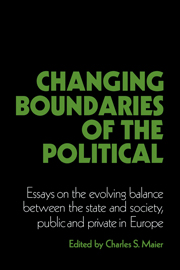 Changing Boundaries of the Political
Changing Boundaries of the Political Book contents
- Frontmatter
- Contents
- List of contributors
- Acknowledgments
- Introduction
- Part I Re-forming the political
- 1 Politics unbound
- 2 Challenging the boundaries of institutional politics: social movements since the 1960s
- 3 Religious transformation and the future of politics
- 4 The politics of time: changing paradigms of collective time and private time in the modern era
- Part II Changing boundaries of political activity
- Part III Uncertain boundaries for political economy
- Index
4 - The politics of time: changing paradigms of collective time and private time in the modern era
Published online by Cambridge University Press: 05 June 2012
- Frontmatter
- Contents
- List of contributors
- Acknowledgments
- Introduction
- Part I Re-forming the political
- 1 Politics unbound
- 2 Challenging the boundaries of institutional politics: social movements since the 1960s
- 3 Religious transformation and the future of politics
- 4 The politics of time: changing paradigms of collective time and private time in the modern era
- Part II Changing boundaries of political activity
- Part III Uncertain boundaries for political economy
- Index
Summary
What is the politics of time?
“Can one tell – that is to say, narrate – time, time itself, as such, for its own sake?” Thomas Mann asked sixty years ago in The Magic Mountain. “That would surely be an absurd undertaking. A story which read: ‘Time passed, it ran on, the time flowed onward’ and so forth – no one in his senses would consider that a narrative.” Is it similarly absurd to inquire into the politics of “time, time itself, as such for its own sake”? Mann, after all, reconsidered. Because time within the story, like time in a dream, ran at a different experiential pace than it did for the author, “it is clear that time, while the medium of the narrative, can also become its subject. Therefore, if it is too much to say that one can tell a tale of time, it is none the less true that a desire to tell a tale about time is not such an absurd idea as it just now seemed.” In the same cautious sense, this chapter takes up the question how politics is about time, and how the time presupposed by politics has changed in the course of history.
Politics concerns time in at least two ways. The first is ideological. Politics comprises one of the fundamental means by which all societies resolve and carry out the decisions that order their collective life. A political decision establishes a rule that will be enforced by the state; community officers can legally invoke physical compulsion if necessary.
- Type
- Chapter
- Information
- Changing Boundaries of the PoliticalEssays on the Evolving Balance between the State and Society, Public and Private in Europe, pp. 151 - 176Publisher: Cambridge University PressPrint publication year: 1987
- 11
- Cited by


